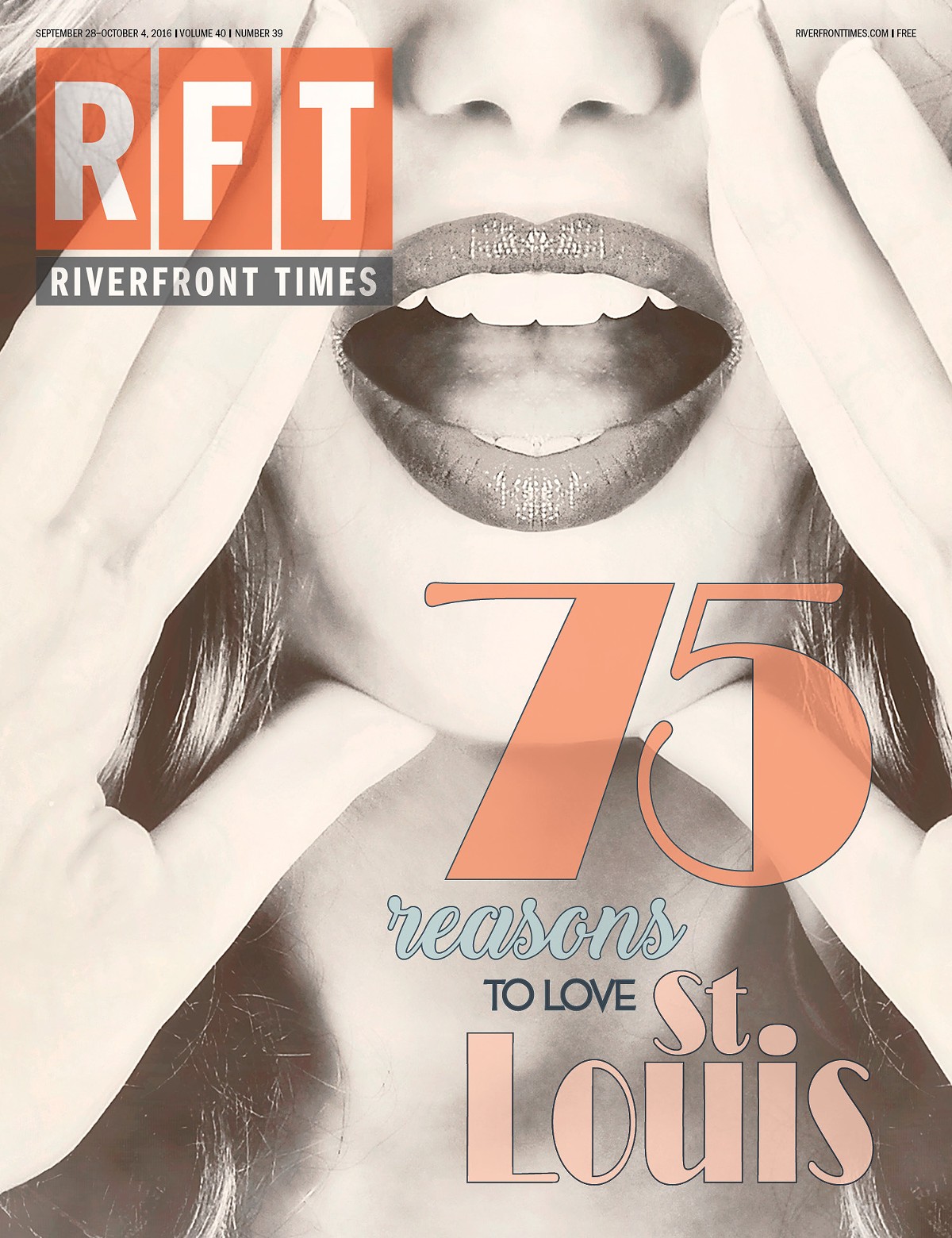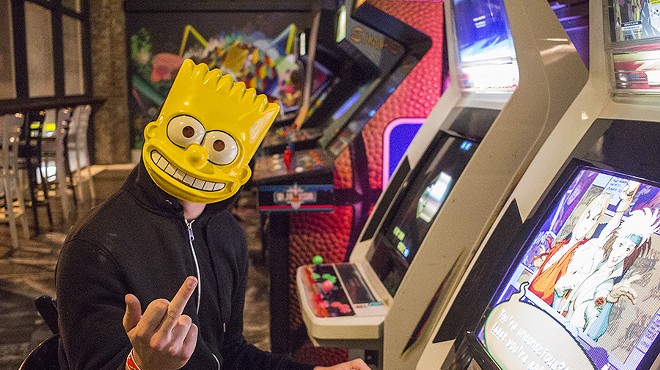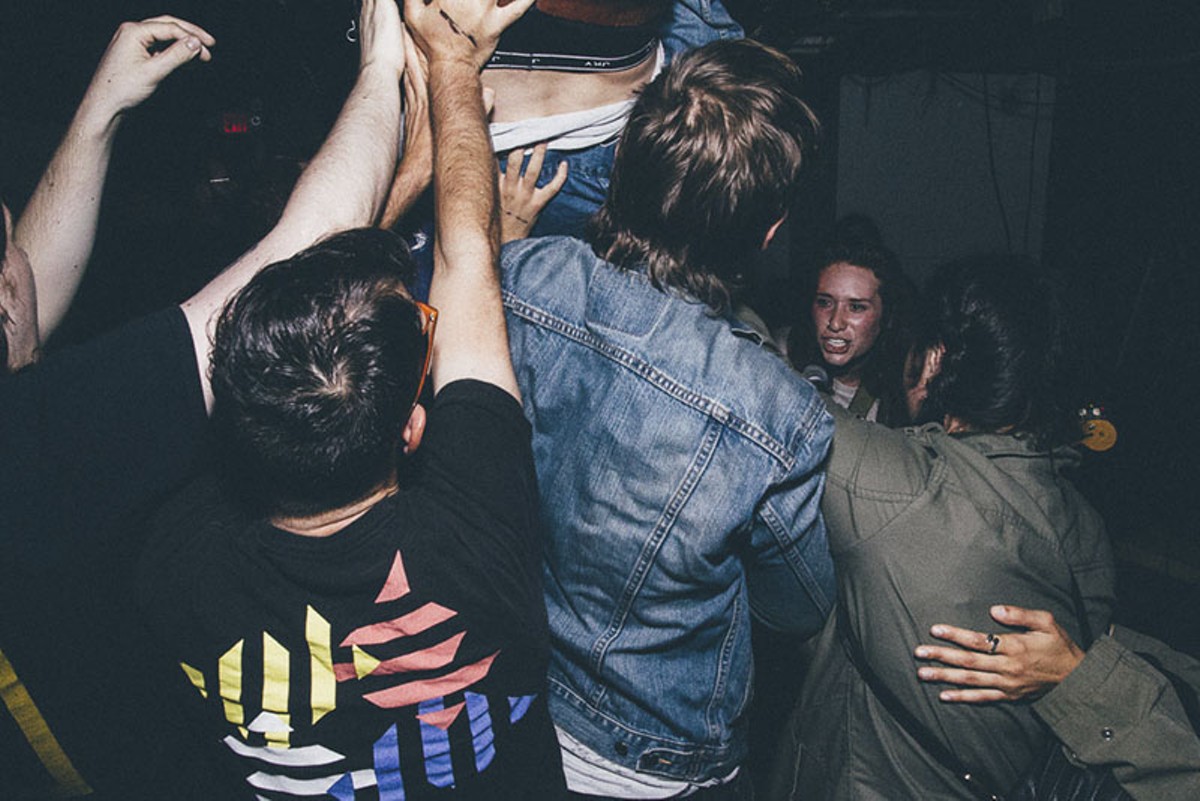
On Cherokee Street, you could easily poke your head in on a half-dozen live shows on any given night without breaking a sweat. The street bustles with activity most weekends as if it were throwing a low-key block party, with groups of the city's hippest and hipster-est residents wandering to and fro as the sounds of live music fill the air.
Start at the intersection of Cherokee and Jefferson, facing west. Foam (3359 S. Jefferson Avenue, 314-772-2100) is to your right; stop on in for some garage-rock fun, or maybe some noise artists, or some experimental rock. Walk two blocks to the Luminary (2701 Cherokee Street, 314-773-1533) — if you're lucky the art gallery will be hosting a LAB Series event, which allows local musicians to take over the building, musically and visually, in whatever way they see fit. Look across the street and you'll see 2720 Cherokee Performing Arts Center (2720 Cherokee Street, 314-875-0233), which is in the midst of evolving into a multi-use artistic complex since Blank Space owner Kaveh Razani became a partner this spring. Within you'll find everything from bluegrass to funk, dance music to soul, hip-hop to psych-rock.
Keep going; walk to the end of the block and take a left on Iowa. Tucked away behind Yaqui's is Kismet Creative Center (3409 Iowa Avenue, 314-696-8177). Maybe it'll be hosting a show — it often is — but if not, grab yourself some records to add to your collection. North of Cherokee on this same street you'll find the Casa Loma Ballroom (3354 Iowa Avenue, 314-282-2258) as well, so don't forget your dancing shoes.
Down two more blocks, if you can resist the siren call of the many Mexican food joints lining the street, you will find the aforementioned Blank Space (2847 Cherokee Street, 314-300-8831). In keeping with its name, the venue is intentionally devoid of an official identity — Razani's stated intent upon opening the club was to be a blank page on which local creatives could express their art. Though all are welcome, St. Louis' hip-hop community has especially found a home here. Walk another block, cross the street and stop in at the Blue Pearl (2926 Cherokee Street, 314-349-2222) for some roots music and a quick bite.
Seven blocks, seven venues, but we're not done yet. Walk two more blocks: There's El Lenador (3124 Cherokee Street, 314-875-9955). Remember El Lenador? It hosted Stag Nite for a few years and became an unlikely hipster hub before Stag Nite host Johnny Vegas and the venue's owner had a falling out. Well guess what: El Lenador is back, if September 24's record release show for Memphis rockers Ex-Cult is any indication. Grab a taco and keep walking if the room is quiet. Walk two more blocks. Tip your cap at Fort Gondo (3151 Cherokee Street, 314-772-3628) along the way — the space seldom hosts live music anymore, but its art installations and spoken-word performances are worthy of your time. Your journey ends with some punk rock, or maybe some country, or maybe some blues, at San Loo (3211 Cherokee Street, 314-696-2888), in the space that formerly housed the Livery.
And there you have it. You have poked your head into ten live music venues in the span of eleven blocks. If you didn't see even one act that piqued your interest — well, we don't believe you, but we still have just the advice you need: Come back tomorrow and try again.
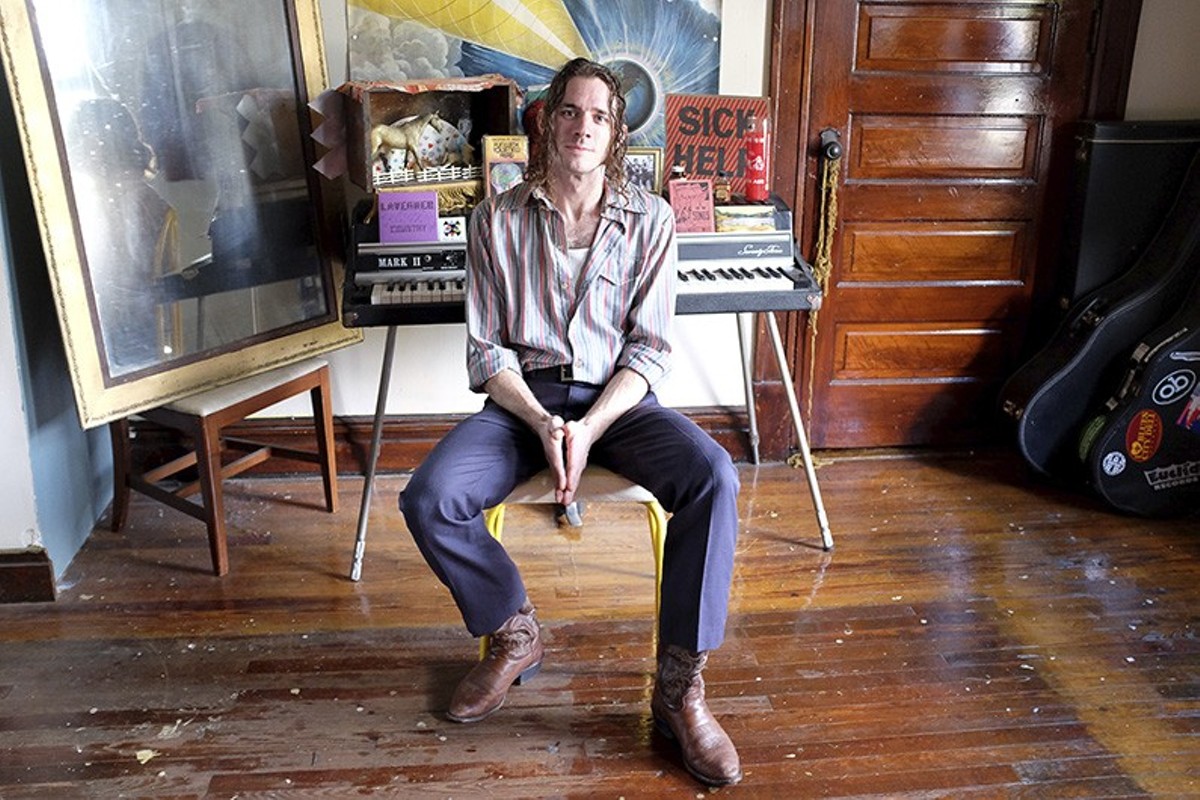
Chris Baricevic is just 30 years old, but he's already been the steady heartbeat of the south St. Louis music scene for more than a decade. The label he started eleven years ago, Big Muddy Records, is one of the region's most revered musical organizations, the St. Louis equivalent to Jack White's Detroit-born Third Man Records.
Big Muddy is not some vanity DIY project. It isn't even a "boutique" label. Its artists are robust, well-practiced, world-class musicians ready to greet the world — Baricevic's long roster has included Pokey LaFarge, Jack Grelle, Sidney Street Shakers, Rum Drum Ramblers, the Hooten Hallers, Southwest Watson Sweethearts, 7 Shot Screamers, Arson for Candy, the Monads and the Vultures.
Baricevic sees his role at the label as a hybrid of motivational producer and a spiritual mentor, but he's more like a seasoned mountaineering guide, willing to carry the baggage so his artists can climb higher and claim their own victories. Baricevic often takes on the role of therapist or shaman (or maybe even mother) when leading his charges. He encourages them to develop their talents, embrace their community and to create art without ego.
His responsibilities go deeper than his current bands, though. He's been the executor of beloved St. Louis musician/photographer Bob Reuter's estate since Reuter's 2013 death, and he's also currently in the process of licensing the music of early 1960s local blues legend Henry Townsend for reissue. Baricevic does this all quietly and without fanfare. In fact, he's so accustomed to staying out of the spotlight that he's only now getting around to performing his own music with his new band, Kristo & the Strange Places.
Pure-hearted and a bit of a romantic, Baricevic's humble exterior conceals a man who is naturally ambitious and seemingly inexhaustible. Authenticity is at the core of everything that he does, and he explains that he only cares to be involved with music that is "screaming from the soul."
This St. Louis native has big plans for the city to "start to claim our creative landscape." He promises, "If I get the resources I need, there is nothing to stop us." Believe that.
Because Our Music Scene Gives Vegas a Run for Its Money: One of 75 reasons we love St. Louis in 2016

When you think Las Vegas, you think entertainment. In addition to the gambling and almost-legal prostitution (always entertaining!), there are the bright lights, the magic shows and the music — oh, the music. Nowhere in America can you see more Elvis impersonators on any given night, filling the vast number of stages in town with shimmering sequins and '50s favorites.
Subtract the Elvis worship, though, and St. Louis gives the Sin City a run for its musical money. According to Wallethub, a consumer website that tracks and ranks U.S. cities on an array of topics with varying degrees of real-world relevance, St. Louis ranks sixth out of the nation's largest 100 cities for overall recreation — barely beaten by Vegas, which came in fifth.
Interestingly, one of the metrics the site used in its research — the number of music venues per capita — had the two cities in a first-place tie. Meaning St. Louis is just as saturated with places to catch live music as one of the most famous musical meccas in the whole country.
Granted, that's "per capita," and Vegas has nearly double the population we do. But that same per capita math is what frequently lands our city on those bullshit "murder capital" lists every year, so we're gonna go ahead and take this one. Plus St. Louis is indeed overflowing with music venues, as each week's stacked roster of concerts can readily attest.
As for Elvis? You can keep your rock & roll impersonators, Vegas. We got the real Chuck Berry right here.
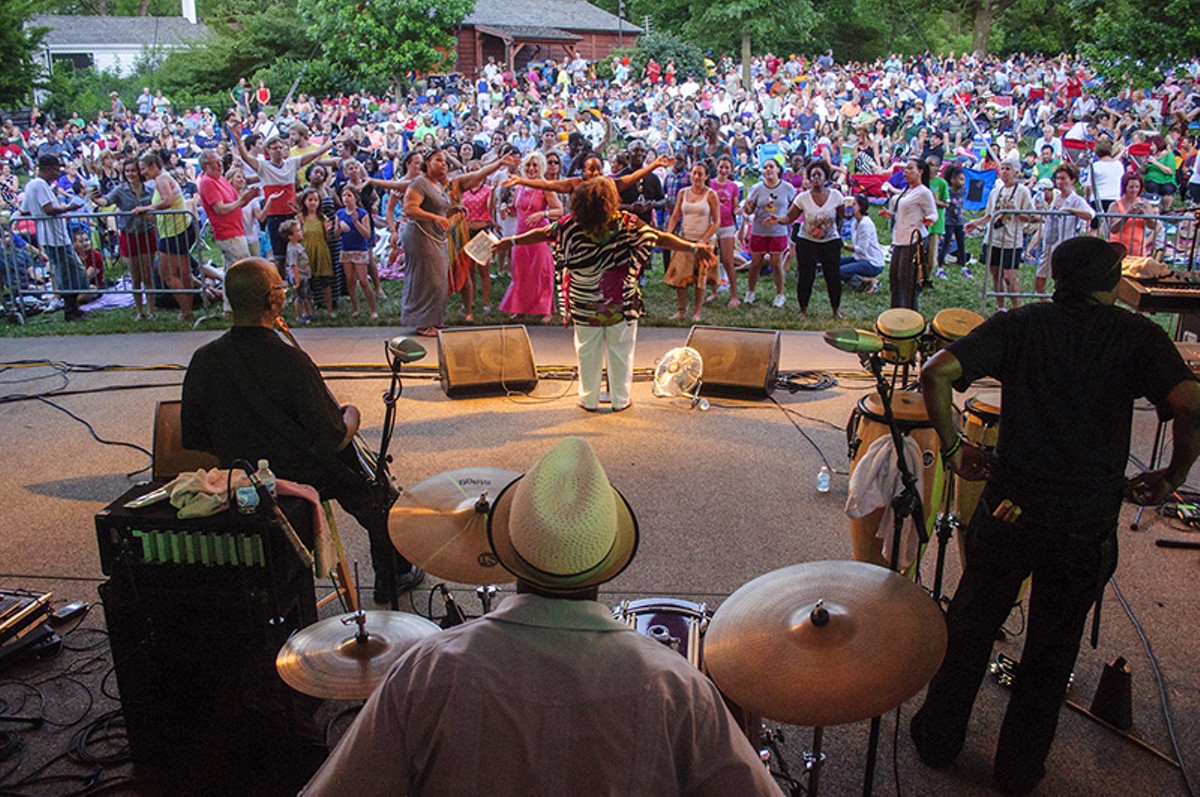
This must be what it's like to be rich — eating fancy foodstuffs while sipping wine and lounging within an exquisitely curated garden. Hired musicians perform late into the warm summer evening for your pleasure. The Whitaker Musical Festival, a weekly series of concerts at the Missouri Botanical Garden (4344 Shaw Boulevard, 314-577-5100), lets us all dream a little. There are few things better than a picnic, a blanket and a patch of grass on the Wednesday nights it's on the schedule. And unlike actual rich people, we don't even have to pay for it. The concerts are all free.

One of the greatest challenges in life is making the quotidian seem romantic. It's perhaps most imperative of all in the middle of flyover country. Ours is typically not the adrenaline rush of being the newest, the biggest, the shiniest. If we manage to be happy, it's because we've found the sublime within the familiar. That's a truth captured in achingly beautiful harmony by the Sleepy Rubies in "South City." From their first plaintive line — "I just want a simple life in St. Louis" — Emily Wallace and Ali Ruby defend the merits of a small and lovely existence against grander dreams. "Over on Gustine/Things are better than they seem," they sing. "We are all we need in south city." The sister act was a surprise pick for LouFest, but in retrospect, the organizers couldn't have made a better selection. The Sleepy Rubies are singing our song, and they're doing it gorgeously.

Damon Davis puts the "discipline" in "multi-disciplinary artist." There's no other way to quantify his reach, his work ethic and his vision in making art, music and film. After making waves as part of the hip-hop duo Scriptz 'N Screwz five years ago, Davis used his skills as a community builder and genre eraser to spearhead the FarFetched collective, a coalition of like-minded musicians heavy on experimentation and in love with collaboration.
But it wasn't until this year's LOA that Davis began releasing music under his own name. On the three-part album, whose first two "acts" have been issued online, Davis shows not only his musical pantheism but his interest and fluency in science fiction. Davis' narrative warps and weaves across space and time, using some Creole mysticism borrowed from his mother's Louisiana upbringing.
For the East St. Louis native, though, the album cycle is a piece of his belief in Afrofuturism and the idea of what he calls "alternative blackness."
"Black people do not get the opportunity to indulge in the future; the writers of sci-fi don't seem to think that we'll make it there," Davis told RFT earlier this year. "I think it's important for creatives to take back that idea of the future. You can make up your own world or country or city and live outside of this system that has been destroying you from day one."
Like the best sci-fi writers, Davis' Afrofuturism serves as a here-and-now commentary rather than as a form of escapism. His and Sabaah Folayan's upcoming documentary on Ferguson and its aftermath, Whose Streets, aims to address the region's racial divide in real enough terms. But with his LOA series, Davis spans space and time to tell his story. He's not looking at the way things are; he's looking at the way they could be. It's an insightful reverie that may tell us more about our city's problems than any nonfiction work ever could.
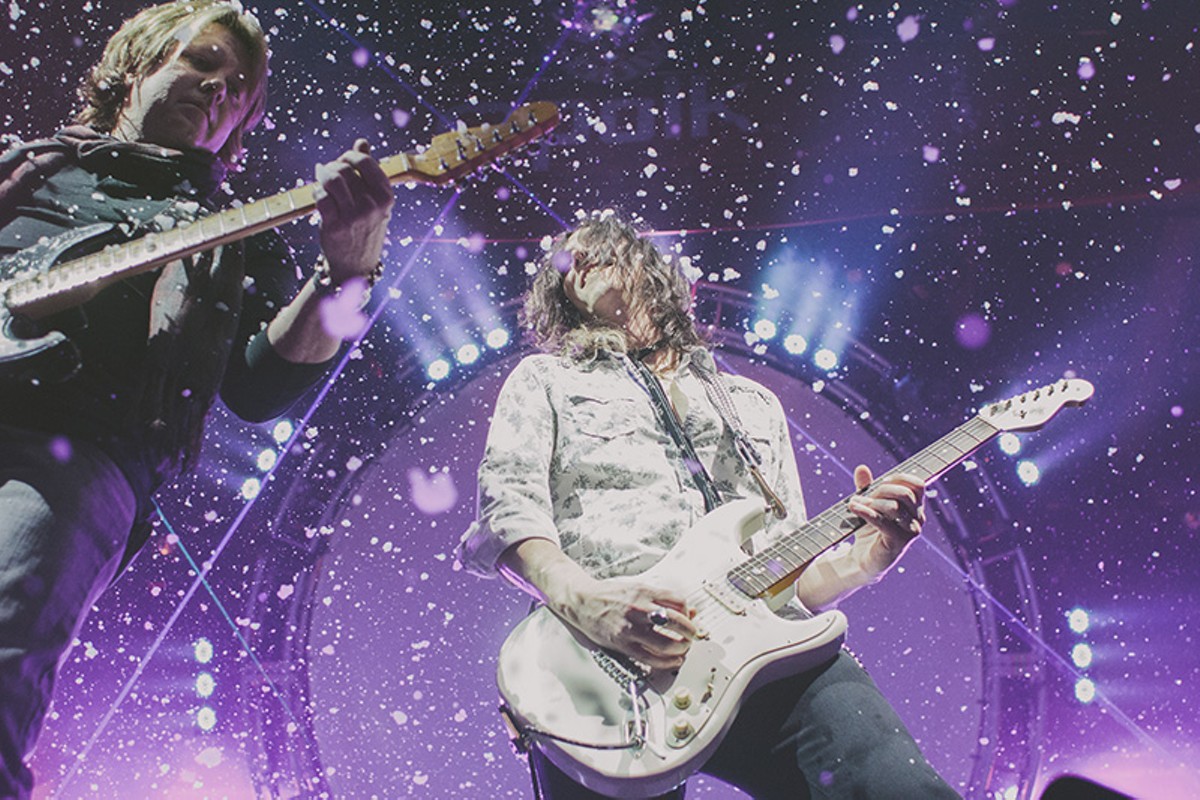
Many chart-topping bands can only dream of selling out shows and playing for crowds of thousands, yet a St. Louis-based cover band has done all that and more for nearly two decades. El Monstero, a tribute to the music of Pink Floyd, is one of many ridiculously talented cover bands that call St. Louis home. Its weeklong run at the Pageant every December has become tradition, with nearly every show a sellout. And this August the band played a 32-song set for a crowd of more than 20,000 at Hollywood Casino Amphitheatre.
It's not just the music that has garnered El Monstero's massive following; it's every aspect of its performances. Each show is full of expertly crafted visuals and theatrics that take attendees on a trip back to a time when psychedelic music was just beginning to take off.
El Monstero band members Mark Quinn, Jimmy Griffin and John Pessoni also compose part of Celebration Day, another top-notch cover band that pays tribute to Led Zeppelin. And the talent doesn't stop there. Witness the talents of FatPocket, the RFT Music Award winner in the Cover Band category this year. Known for bringing the party, FatPocket plays high-energy covers of everything from '60s music to current Top 40. Catch them everywhere from Jammin' at the Zoo to the Trainwreck Saloon — or go see Bullseye Womprats, the St. Louis Big Band, Dance Floor Riot or many, many more. Yes, they're all cover bands, and they're all consistently a good time. Give in to the fun.

Muhammad "Mvstermind" Austin is hardly the first hip-hop artist to rap about money — talking up your bankroll is part of the game — but on this year's single "Mali Moolah," Mvstermind deployed his characteristic frankness to talk up the struggles of getting paid. As an artist whose mind is usually attuned to a higher calling, he settles on something more than dollar signs: "I knew my worth since birth / I don't need no money."
The song is a stunner on its own, but the accompanying video is a personal and expansive view of the artist and his environment. The clip offers both a birdseye and on-the-street view of St. Louis, but it's not one likely to be used by the regional tourism board. We follow Austin from the city's urban core — the Moolah Theatre on Lindell, a payday loan joint on Jefferson, a Save A Lot parking lot — to grand vistas of a greened-over flood plain and an early-spring reverie on a riverbank. Director Louis Quatorze captures the vastness of these landscapes with quick, immersive cuts and drone-assisted overviews, but Austin stays in the center of the frame, his clear, piercing eyes locked on yours. The video's emotional payoff finds the rapper in his childhood home, now vacant, blown-out and on the verge of collapse.
The local hip-hop community has been keyed into Mvstermind and his MME crew for a few years, but it was no small victory that the "Mali Moolah" video introduced the wider world to Austin's slice of STL when it was broadcast on June 3 on the channel BET Jams. Even if it was only for four minutes, Mvstermind's vision and talent filled TV screens coast to coast.
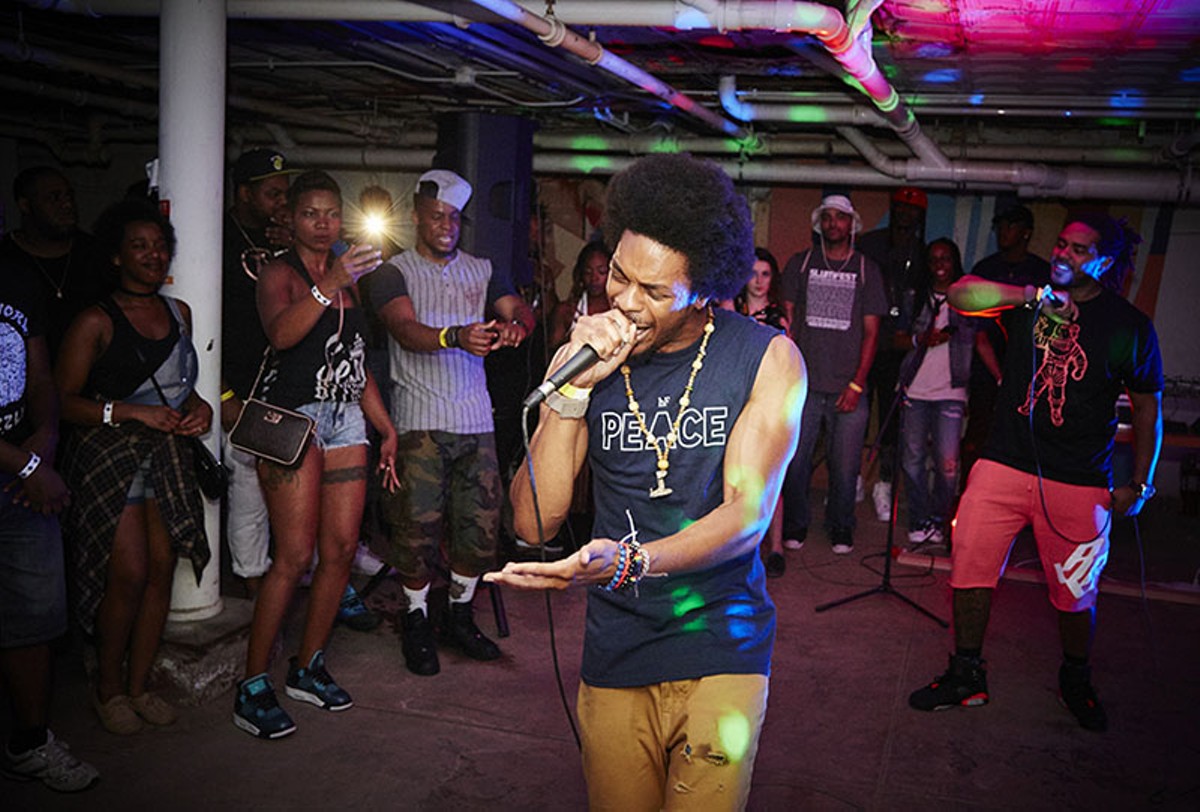
In a 2011 interview with Riverfront Times, S.L.U.M. Fest co-founder John Harrington was concise when asked about his goals for the then-fledgling festival. "In the long-term, I'd like to grow it out to a three- or four-day event, with panel discussions and guest speakers, something people come from all over to see," he said. "Something like a Scribble Jam or SXSW, but here in St. Louis."
In its seventh iteration this June, the St. Louis Underground Music Festival moved closer to that goal than ever, with the festivities stretched to cover an entire weekend. Friday brought a pre-party at Cicero's; Sunday saw an "Artist Appreciation Day" cookout at Blank Space. Saturday's twelve hours of hip-hop was the main event, with more than 70 performers filling 2720's stages with music all day long.
Since getting its start as a local hip-hop showcase in 2010, S.L.U.M. Fest has continuously grown, now including out-of-town artists on its roster and even adding a second annual event, the S.L.U.M. Fest Hip-Hop Awards, to the calendar. S.L.U.M. Fest isn't just about the emcees and deejays, though — as was the case with Cincinnati's much-missed Scribble Jam festival, the event's organizers recognize that hip-hop comprises four elements, with breakdancers and graffiti artists performing and competing as well.
At this point the festival is truly the largest of its kind in the entire Midwest, a who's-who of local and regional underground acts — and it has nowhere to go but up.
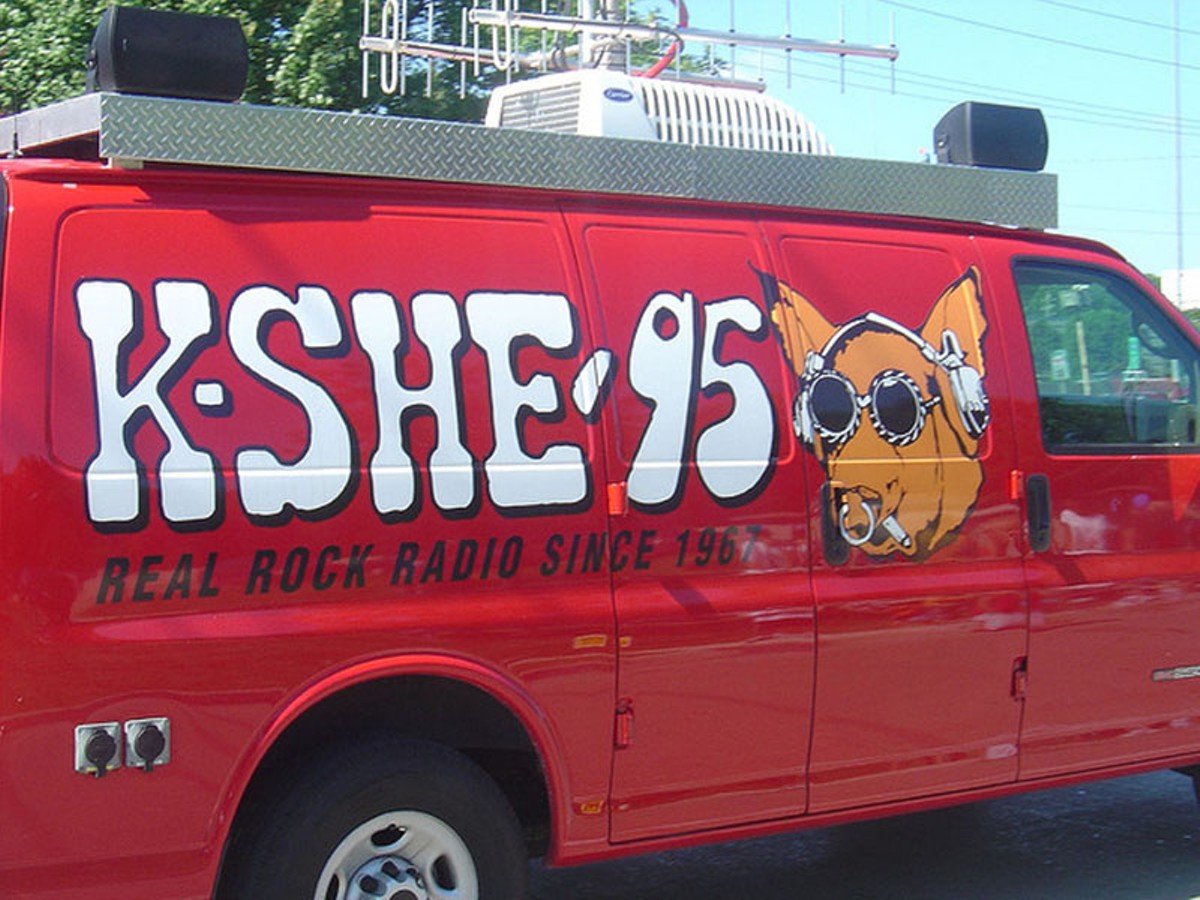
Time has a way of changing everything in subtle, nigh unnoticeable ways. Playgrounds are smaller, your pants are tighter and KSHE-95's Sweetmeat is old enough to need the dreaded annual proctologist visit. The station's format has changed slightly, too, or at least it has from the standpoint of whatever your idea of KSHE's heyday is. You're still going to hear Pink Floyd at some point during the day, and probably a little ELO, but you'll also hear the Struts and Green Day.
But Sunday is for the older crowd. The long-running KSHE Klassics program on 94.7 FM is still going strong, and Sunday from 8 a.m. to noon features cuts by the greats (Todd Rundgren), the legends (Budgie's "Sky High Percentage" is legendary. Fight me) and the "who the hell was that," like Tucky Buzzard and Pousette-Dart Band. And every now and then you'll catch the Outlaws in full flight, honking down the highway through "Breaker-Breaker," the sweetest piece of country-fried rock Hughie Thomasson ever wrote.
You're gonna spend the next couple hours flipping through your own vinyl trying to find Lady in Waiting, but that's not a bad Sunday. If you're lucky, maybe it shows up on the Seventh Day, the Sunday night staple. The format is simple: Seven solid classic records are played straight through back-to-back, with commercial breaks between the A and B sides. Favazz replaced Radio Rich Dalton in March 2015, and he mixes in a few more modern classics than some listeners are comfortable with — Pearl Jam's Vs. is still kinda young, no? — but Rush's ball-busting namesake debut and Head East's Flat as a Pancake chasing Stevie Nicks' The Wild Heart is a pretty good prescription for coming down from the weekend.

